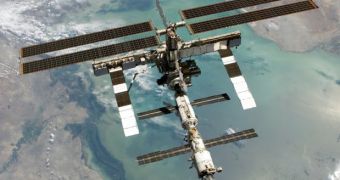The month of April will find the first Korean astronaut ever in space on board the International Space Station. During a recent interview, Ko San stated that he would take soil from both South and North Korea into space and mix it in a gesture of unity towards the divided Korean peninsula. The 31-year-old Korean astronaut is a scientists and amateur boxer and will be flown on board the ISS with the help of a Russian Soyuz rocket.
The scheduled mission will also take Russian astronaut Sergei Volkov to the ISS in order to replace the current commander of the space station, Peggy Whitson and the Russian flight engineer Oleg Kononenko. After conducting a series of experiments into space over a period of ten days, Ko San will return to the surface of the Earth along with Whitson.
Ko San also revealed that Korea has long term plans involving their space program and will continue collaborating with NASA, but is currently uncertain when the next Korean astronaut flies into space to continue the experiments that Ko will initiate in April. Similarly to many space agencies around the world, Korea also has plans for a moon exploration program.
This particular mission cost the Korean government about 28 million U.S. dollars and involved resolving the applications on more than 36,000 people willing to become the first Korean into space. During the time in which he applied for the job, Ko was working for the Korea Aerospace Research Institute and was involved in the development of a computer vision system. He has studied mathematics and cognitive science, and as an amateur boxer, he won the bronze medal in a national boxing contest, more than four years ago.
Well, while the Korean Space Agency is taking a huge step into its space program, NASA still has to figure how it will manage to finish the ISS until 2010. The project currently evaluated at about 100 billion U.S. dollars is only 60 percent finished and by the look of the space shuttle, respecting the deadline imposed by the U.S. government looks rather far fetched.
The Atlantis space shuttle, which was supposed to take the European space module Columbus towards the ISS, is still uncertain for flight and the scheduled mission designed to take the Japanese module into space approaches fast.

 14 DAY TRIAL //
14 DAY TRIAL //